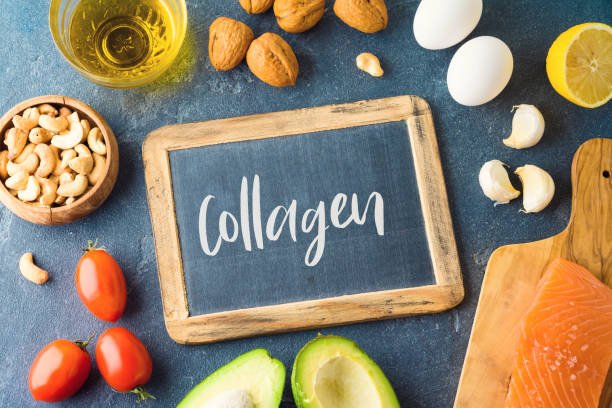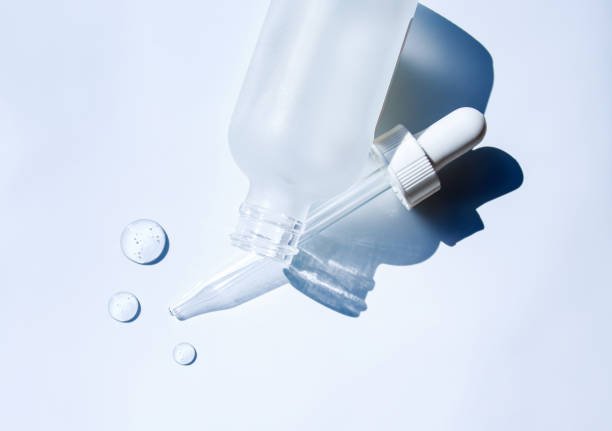What is raw shea butter?
Shea butter is a natural fat extracted from the nuts of the shea tree (Vitellaria paradoxa), primarily found in Africa. For centuries, people have turned to this creamy, natural balm to soothe dry skin, calm irritation, and restore a radiant glow. Unlike many synthetic products, shea butter penetrates deeply, replenishing moisture and delivering nutrients that promote elasticity and softness.
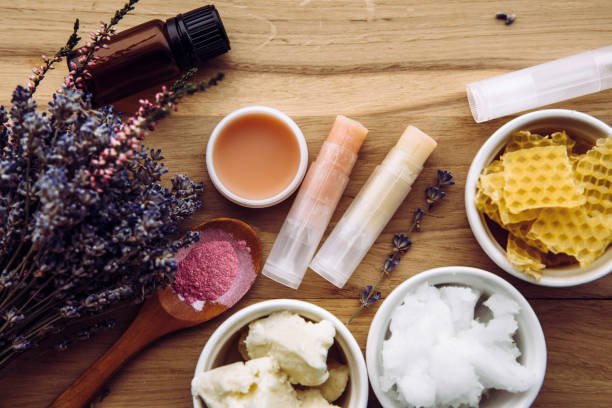
Its versatility extends beyond skincare—shea butter is also used to improve hair health, protect against environmental damage, and even promote the healing of minor wounds and burns. With its natural anti-inflammatory and antioxidant properties, it’s no wonder shea butter is considered a beauty secret passed down through generations. Discover how unlocking the power of this miracle ingredient can reveal your skin’s most vibrant, healthy state.
Raw Shea butter benefits for beauty
Wondering what makes raw shea butter so powerful for your overall health? Packed with essential nutrients, it isn’t only a skincare hero but also a beauty staple for both skin and hair.
• Rich in Nutrients:
Raw shea butter is packed with vitamins A, E, and F, providing essential nutrients that nourish and protect the skin and hair.
• Deep Moisturization:
Its natural oils deeply hydrate and soften skin, making it ideal for dry, cracked, or rough areas like elbows, knees, and heels.
• Anti-Inflammatory:
Shea butter contains compounds that reduce inflammation, making it effective for calming irritated or inflamed skin conditions such as eczema, dermatitis, and psoriasis.
• Promotes Skin Healing:
Raw shea butter accelerates wound healing and helps reduce the appearance of scars, stretch marks, and blemishes.
• Natural Sun Protection:
It offers mild UV protection (SPF 3-4), acting as a natural defense against sun damage and environmental stressors.
• Restores Hair Health:
When applied to hair, raw shea butter moisturizes the scalp, reduces dandruff, and repairs damaged or dry strands.
• Improves Skin Elasticity:
Its high concentration of fatty acids improves skin elasticity, helping to reduce the appearance of fine lines, wrinkles, and stretch marks.
• Safe for Sensitive Skin:
As it’s unprocessed, raw shea butter is free from harmful chemicals and additives, making it gentle and safe for all skin types, including sensitive and allergy-prone skin.
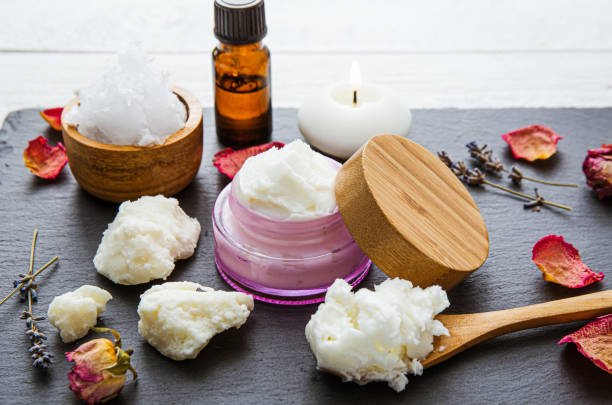
Shea Butter Benefits for Hair: The Ultimate Elixir for Stronger, Healthier Strands
Struggling with dry, brittle hair? Shea butter works wonders for restoring moisture, promoting growth, and repairing damage. Let’s explore how it transforms your hair care routine.
1 Deep Moisturization: Shea butter is a natural emollient that deeply hydrates dry, brittle hair, restoring moisture and softness.
- Promotes Hair Growth: Rich in vitamins and essential fatty acids, shea butter strengthens hair follicles, reducing breakage and promoting healthier, longer growth.
- Repair Damaged Hair: Its nourishing properties help repair split ends and protect hair from heat styling, chemical treatments, and environmental stressors.
- Reduces Scalp Irritation: Shea butter’s anti-inflammatory properties soothe itchy, dry, and irritated scalps, promoting overall scalp health.
- Natural UV Protection: It forms a protective barrier that shields hair from harmful UV rays and environmental pollutants.
- Tames Frizz and Adds Shine: Shea butter smooths the hair cuticle, reducing frizz and adding a natural, healthy shine.
- Strengthens and Softens: Its rich nutrients fortify hair strands while leaving them soft and manageable.
- Balances Oil Production: It helps balance the scalp’s natural oils, preventing excess oiliness while still keeping hair hydrated.
Glow Naturally: The Skin-Revitalizing Power of Raw Shea Butter for Your Face
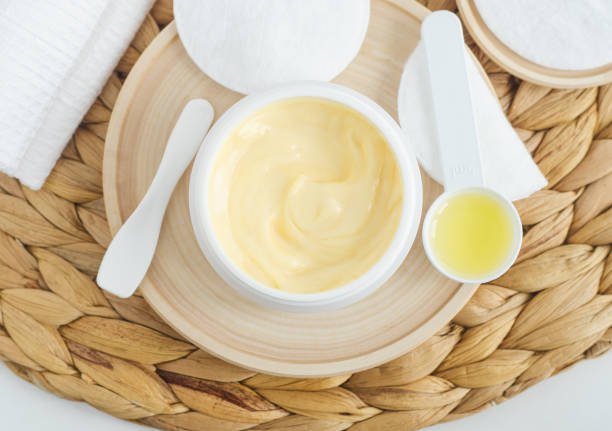
Looking for a natural glow? Shea butter delivers powerful hydration and anti-aging benefits, perfect for restoring your skin’s youthful radiance.
1 Intense Hydration:
Shea butter provides deep, long-lasting moisture, perfect for dry skin, leaving it soft and supple.
2 Anti-Aging Properties:
Rich in vitamins A and E, shea butter helps reduce the appearance of fine lines and wrinkles by boosting collagen production and improving skin elasticity.
3 Calms Inflammation:
Its anti-inflammatory properties soothe irritated, red, or sensitive skin, making it ideal for those with eczema, rosacea, or acne-prone skin.
4 Natural Skin Barrier:
Shea butter forms a protective layer that locks in moisture while shielding skin from environmental stressors and pollutants.
5 Evens Skin Tone:
Regular use of shea butter can help reduce dark spots, hyperpigmentation, and blemishes, promoting a more even complexion.
6 Non-Comedogenic:
Despite its rich texture, shea butter is non-comedogenic, meaning it won’t clog pores, making it safe for all skin types, including oily or acne-prone skin.
7 Boosts Skin Healing:
Its healing properties aid in the recovery of minor cuts, sunburns, and acne scars, helping to restore skin’s natural glow.
Raw Shea Butter: Side Effects, Warnings, and Comparisons with Synthetic Products
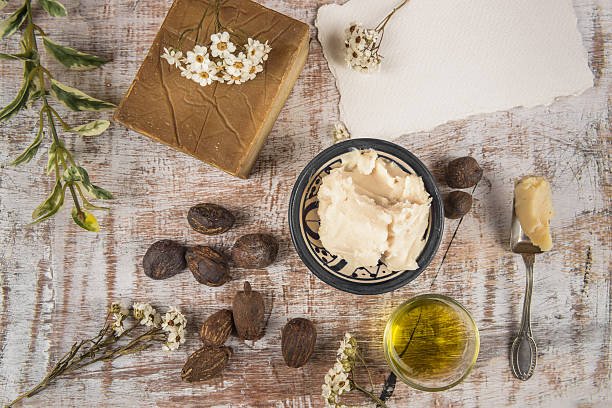
Potential Side Effects and Warnings
Shea butter is safe for most people, but one needs to follow the following precautions to rule out various potential side effects:
- Allergic Reactions:
- A number of people could have allergic reactions to shea butter, especially those with a susceptibility to nuts.
- Symptoms may vary from rashes, itching, redness to swelling.
- Always practice a patch test before general application.
- Comedogenic Properties:
– Shea butter is generally not comedogenic, though on rare occasions, it can block pores among people having very oily skin or those with acne.
– This can even spark breakouts or increase acne one currently suffers from. - Interaction with Medications:
- If you have been prescribed topical medications, consult a healthcare professional before using shea butter, as it may interfere with the absorption of some topical treatment.
- Pregnancy and Breastfeeding:
- Commonly regarded as safe, pregnant or breastfeeding women may consult a health professional before extensive use of shea butter.
- Contamination Risk:
- Poorly stored or handled raw shea butter can be tainted with bacteria or mold.
– Always purchase from trusted sources and store well.
- Photosensitivity:
– While shea butter does give some UV protection, it should not replace actual sunscreen.
– When relying too much on shea butter to protect against the sun, this could bring sunburn, or even worse skin degradation. - Skin Irritation:
- It causes skin irritation in rare cases due to the addition of some factor in the shea butter or not being pure enough.
Comparison with Synthetic Products
While comparing shea butter with synthetic skincare or hair care products, several factors need to be taken care of:
- Moisturizing Properties: Raw Shea Butter: Natural, deep moisturization without clogging pores for most people.
- Artificial Moisturizers: Most of the time contain occlusives like petroleum jelly, which create a barrier but do not penetrate as deeply.
- Ingredient Transparency:
– Shea Butter: Singular ingredient, natural in origin, and its composition is well-recognized.
– Synthetic Products: Most times contain more than one ingredient, and some of those may be artificial, or even potentially harmful. - Environmental Impact:
- Raw Shea Butter: Biodegradable and often sustainably sourced.
- Synthetic Products: These can have non-biodegradable ingredients and also include more extensive processing methods.
- Allergenic Potential:
– Shea Butter: Nut allergens can be present.
– Synthetic Products: A number of potential allergens exist, but hypoallergenic formulations are possible. - Shelf Life:
– Shea Butter: Ordinarily, it is usable for 12 to 24 months in most cases if well preserved.
- Synthetic Products: Generally, have longer shelf life with the addition of preservatives.
- Versatility:
Shea Butter: Very versatile in usage for skin and hair, but a little limited as far as different types available to the formulator.
Synthetic Products: Come in a wide range of specialized formulations in targeting specific needs.
- Absorption:
– Shea Butter: Can appear greasy, oily, or heavy; this is especially true of raw shea butter.
- Synthetic Products: These are usually designed to be quickly absorbed and feel lighter on the skin.
- Price:
– Raw Shea Butter: Generally less expensive per quantity, especially when bought in bulk.
– Synthetic Products: Highly variable, though luxury products can easily range into the hundreds. - Scent:
– Raw Shea Butter: Natural nutty odor, which for some is fairly disagreeable.
Manufactured Products: Usually contain artificial fragrances masking the base smells and pleasing consumers.
- Scientific Evidence-based:
– Raw Shea Butter: Backed by a few scientific researches, though it is quite less than most of the other synthetic ingredients.
– Synthetic Products: Usually, these products are backed with extensive research and clinical trials for their effectiveness.
As beneficial as shea butter is and as great a natural product, the time has come to consider individual skin types, different needs, and even the risks when considering whether to go for natural or synthetic skincare products. Always consult a dermatologist or healthcare professional for advice about your specific situation, especially if you have skin concerns or conditions that may be affected.
Frequently asked questions about raw shea butter
Can shea butter be applied to all skin types?
Shea butter is generally safe for all skin types, including sensitive and acne-prone skin. However, doing a patch test first is always a good idea to make sure you are not allergic to it.
How do I apply it on my skin?
To apply raw shea butter, take the desired amount and heat it up in between the palms of the hands until it melts and then massage into the skin. It can be applied to the face, body, or any area that might need that extra little oomph of moisturizing.
How should raw shea butter be stored?
Shea butter has to be in a cool, dry place away from direct sunlight. It needs to be in an airtight container in order for the quality to not deteriorate and for the shelf life to be longer.
What is the difference between raw and refined shea butter?
Raw shea butter is unprocessed and retains all its nutrients, along with its natural smell. Refined shea butter, on the other hand, has undergone processing to eliminate impurities and odors that may reduce its nutritional value.
conclusion
Raw shea butter is a potent ingredient in natural beauty, used for deep moisturizing and nourishing both skin and hair. Rich in vitamins A, E, and F, as well as essential fatty acids, it helps to soothe and heal dry, irritated skin, while also improving elasticity and reducing the appearance of fine lines and wrinkles. When applied to hair, it restores moisture, repairs damage, and promotes healthy growth by strengthening the follicles. Its anti-inflammatory and antioxidant properties make it suitable for sensitive skin and those suffering from conditions like eczema or psoriasis. Additionally, raw shea butter acts as a mild sun protectant and shields the skin from environmental stressors.
sources:

